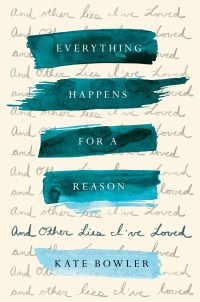I am at the office, pacing at my treadmill desk and flipping through my latest research, when my phone rings. “Hello, this is Kate.” It’s Jan from the doctor’s office. She has a little speech prepared, but my mind is zeroing in and out. I can hear that she is talking, but I can’t make out the words. It is not my gallbladder, I catch that much. But now it is everywhere. “What’s everywhere now?” I ask. “Cancer.” I listen to the buzz of the phone. “Ms. Bowler.”
The treatment at Emory begins at the end of October. I am tired most of the time, but I feel driven to catalog everything and wring every bit of time for all it’s worth. I start to write. In bed, in chemo chairs, in waiting rooms, I try to say something about dying in a world where everything happens for a reason. Whenever there is a clarifying moment of grief, I jot it down.
And then, in a flurry, I shoot it off to The New York Times, not thinking too much about whether it’s any good but sending it because I have been infected by the urgency of death. Then an editor there sees it and puts it on the front page of the Sunday Review. Millions of people read it. Thousands share it and start writing to me. And most begin with the same words. “I’m afraid.”
Me too, me too.

“I’m afraid of the loss of my parents,” writes a young man. “I know I will lose them someday soon, and I can’t bear the thought.” “I’m afraid for my son,” says a father from Arkansas. “He has been diagnosed with a brain tumor at forty-four, which would have been devastating enough if he had not already lost his identical twin brother to the same disease a few years ago.”
These letters sing with unspeakable love in the face of the Great Separation. Don’t go, don’t go, you anchor my life. It feels as though the world has been cracked open, and it bleeds and bleeds. Hundreds of emails, letters, pictures, and videos fill my inbox and campus mailbox. Strangers pour out their fury at every stage of their own grief. Depression settles on the pages like a fog.
A young man writes: “I guess I was hoping that God would make something of this. But it has come to nothing.” The void is deep and bottomless. And it is an unmerciful fact that some people have the right to look into my eyes and say, “You’re lucky.” A young woman gently explains to me that cancer had stolen her fertility only months before she met the love of her life. If ever she shakes the disease, even for a little, she will try to adopt. “Hold your son close, you’re so fortunate to have him.”
There is plenty of denial, and plenty of the deals people attempt to broker with God. “I am an atheist, but I put it aside, and I begged God to take the cancer away from my son and to put it into me.”
Many people write to me like family. “As a father, I am truly sorry.” “I’m a mother and I wish I could give you a hug right now.” They want to comfort me, but their experiences tell them that life is never fair. “I want you to know how much I’m praying for you and grateful for your faith. I’m sorry that we must say, like Job, ‘Though He slay me, yet will I trust in Him.’”
Yes, yes, yes. Yet will I trust in him. I don’t know what the word “trust” means anymore, except there are moments when I realize that it feels a lot like love.
My inbox is full of strangers giving reasons. But most everyone I meet is dying to make me certain. They want me to know, without a doubt, that there is a hidden logic to this seeming chaos. Even when I was still in the hospital, a neighbor came to the door and told my husband that everything happens for a reason. “I’d love to hear it,” he replied. “Pardon?” she said, startled. “The reason my wife is dying,” he said in that sweet and sour way he has, effectively ending the conversation as the neighbor stammered something and handed him a casserole.
The letters that really speak to me don’t talk about why we die; they talk about who was there. A man writes to me about being taken hostage with his family and watching helplessly as the intruders pressed guns against his children’s noses while his wife and daughter were threatened with rape. But God was there and he can’t explain it. He can’t explain who loosened the ropes and let him escape with his family unharmed. And he will never understand why he survived when his neighbor was found outside hanging by a rope the next morning.
He doesn’t rationalize why some people are rescued and others are hanged and doubts there is a way that God “redeems” situations by extracting good from them. But he knows God was there because he felt peace, indescribable peace, and it changed him forever. He ends the letter with a shrug: “I have no idea how this works, but I wish this for you as you move forward.”
His description matches something I read in the newspaper the other day that summarized the findings of the Near Death Experience Research Foundation, and, yes, there is such a thing. Thousands of people were interviewed about their brushes with death in every kind of situation—being in a car accident, giving birth, attempting suicide, et cetera—and many described the same odd thing: love.
I’m sure I would have ignored the article if it had not reminded me of something that happened to me, something that I felt uncomfortable telling anyone. It seemed too odd and too simplistic to say what I knew to be true—that when I was sure I was going to die, I didn’t feel angry. I felt loved.
In those first few days after my diagnosis, when I was in the hospital, I couldn’t see my son, I couldn’t get out of bed, and I couldn’t say for certain that I would survive the year. But I felt as though I’d uncovered something like a secret about faith. Even in lucid moments, I found my feelings so difficult to explain. I kept saying the same thing: “I don’t want to go back. I don’t want to go back.”
At a time when I should have felt abandoned by God, I was not reduced to ashes. I felt like I was floating, floating on the love and prayers of all those who hummed around me like worker bees, bringing notes and flowers and warm socks and quilts embroidered with words of encouragement. They came in like priests and mirrored back to me the face of Jesus. When they sat beside me, my hand in their hands, my own suffering began to feel like it had revealed to me the suffering of others, a world of those who, like me, are stumbling in the debris of dreams they thought they were entitled to and plans they didn’t realize they had made.
That feeling stayed with me for months. In fact, I had grown so accustomed to that floating feeling that I started to panic at the prospect of losing it. So I began to ask friends, theologians, historians, pastors I knew, and nuns I liked, “What am I going to do when it’s gone?”
And they knew exactly what I meant because they had either felt it themselves or read about it in great works of Christian theology. Augustine called it “the sweetness.” Thomas Aquinas called it something mystical like “the prophetic light.” But all said yes, it will go. The feelings will go. The sense of God’s presence will go. There will be no lasting proof that God exists. There will be no formula for how to get it back. But they offered me this small bit of certainty, and I clung to it. When the feelings recede like the tides, they said, they will leave an imprint. I would somehow be marked by the presence of an unbidden God.
It is not proof of anything. And it is nothing to boast about. It was simply a gift. I can’t reply to the thousands of emails with my own Five-Step Plan to Divine Health or series of powerful formulas, which guarantee results. I suppose I am like the man who wrote to me to say he had seen a friend swinging from a tree and felt the presence of God in the same long, dark night. Yes. That is the God I believe in.
I can’t reconcile the way that the world is jolted by events that are wonderful and terrible, the gorgeous and the tragic. Except I am beginning to believe that these opposites do not cancel each other out. I see a middle-aged woman in the waiting room of the cancer clinic, her arms wrapped around the frail frame of her son. She squeezes him tightly, oblivious to the way he looks down at her sheepishly. He laughs after a minute, a hostage to her impervious love.
Joy persists somehow and I soak it in. The horror of cancer has made everything seem like it is painted in bright colors. I think the same thoughts again and again: Life is so beautiful. Life is so hard.
What would it mean for Christians to give up that little piece of the American Dream that says, “You are limitless”? Everything is not possible. The mighty kingdom of God is not yet here. What if rich did not have to mean wealthy, and whole did not have to mean healed? What if being people of “the gospel” meant that we are simply people with good news? God is here. We are loved. It is enough.
Kate Bowler is an assistant professor in the school of divinity at Duke University, the author of Blessed: A History of the American Prosperity Gospel, and host of Everything Happens, a podcast featuring honest conversations about life’s toughest challenges. She lives in North Carolina with her husband and son.
This excerpt was adapted from the book Everything Happens for a Reason: And Other Lies I’ve Loved by Kate Bowler. Copyright © 2018 by Kate Bowler. Published by Random House, an imprint and division of Penguin Random House LLC. All rights reserved.










